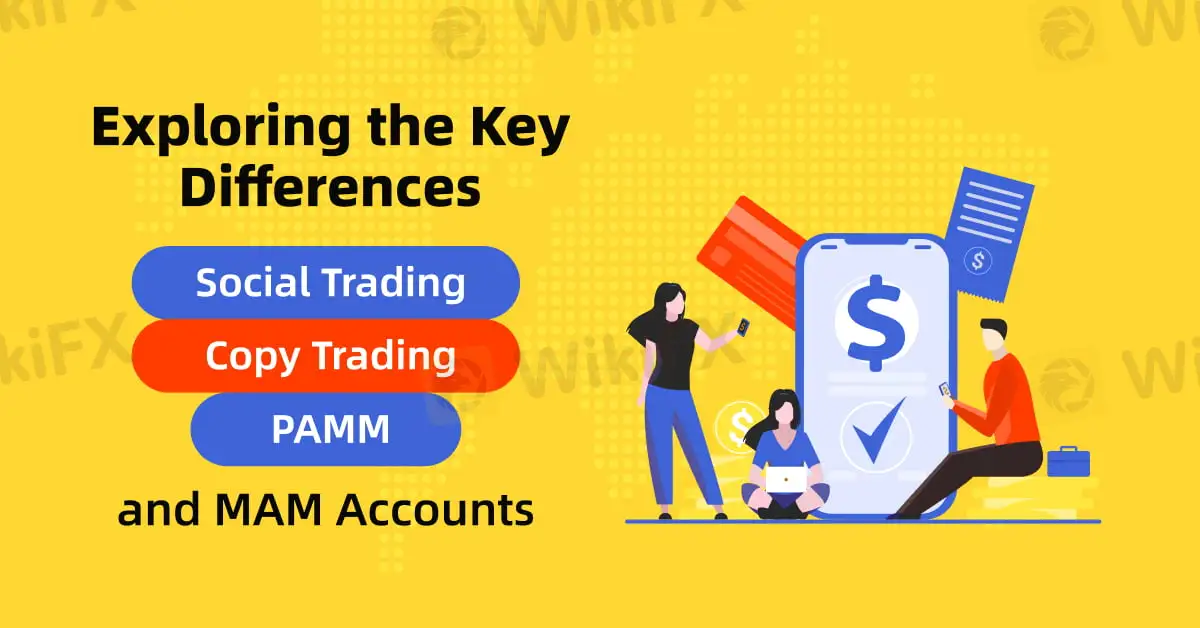简体中文
繁體中文
English
Pусский
日本語
ภาษาไทย
Tiếng Việt
Bahasa Indonesia
Español
हिन्दी
Filippiiniläinen
Français
Deutsch
Português
Türkçe
한국어
العربية
Exploring the Key Differences: Social Trading, Copy Trading, PAMM, and MAM Accounts
Abstract:In the world of online trading, various account types and trading models allow investors to participate in the market with varying levels of involvement. Among the most popular are social trading, copy trading, PAMM (Percentage Allocation Management Module), and MAM (Multi-Account Manager) accounts.

In the world of online trading, various account types and trading models allow investors to participate in the market with varying levels of involvement. Among the most popular are social trading, copy trading, PAMM (Percentage Allocation Management Module), and MAM (Multi-Account Manager) accounts. While each of these methods has its own advantages, understanding their differences is crucial for selecting the one that best aligns with an investor's goals and risk tolerance.

Social trading is a relatively new concept that allows traders to observe the strategies and trading behaviours of others within a community. Platforms that offer social trading often feature live feeds where users can view, comment on, and discuss trades made by others. This model promotes transparency, enabling traders to learn from others by following more experienced investors. While its a great tool for beginners to learn, social trading is not necessarily automated. Participants still need to manually replicate trades they like unless the platform also incorporates copy trading functionality. The focus here is on fostering a community-driven environment where information and strategies are shared.

Copy trading takes the concept of social trading one step further by automating the process. Instead of manually placing trades based on observations, investors can directly copy the trades of experienced traders. The investors account mirrors the trades of the selected trader in real time, automatically replicating the trades at the same proportion. This model appeals to individuals who prefer a hands-off approach, as it requires minimal involvement once set up. However, risks are inherent in copy trading as the investor is completely reliant on the chosen trader's decisions. Platforms offering copy trading usually allow investors to choose traders based on risk profiles, past performance, and strategies.

PAMM accounts function similarly to managed funds. In this model, investors allocate their funds to a professional trader or money manager, who then manages these pooled investments. The distinguishing feature of PAMM is that the manager‘s own capital is also part of the fund, aligning the manager’s interest with the investors. Profits and losses are distributed among investors based on their percentage of the total pool. Unlike copy trading, PAMM account investors do not choose specific trades to follow; instead, they trust the manager to make all decisions on their behalf. PAMM accounts offer an efficient way to outsource trading but require trust in the managers expertise.

MAM accounts are an extension of PAMM, offering more flexibility to both managers and investors. In a MAM account, the manager has the ability to allocate trades in different proportions to various client accounts, allowing for a more customized trading approach. For instance, clients with higher risk tolerance can take on more exposure to certain trades than those with a conservative profile. MAM accounts are ideal for professional traders managing multiple clients with differing needs. The added flexibility of MAM accounts makes them popular among hedge funds and institutional traders.
In summary, choosing between social trading, copy trading, PAMM, and MAM accounts depends on an investors objectives and risk appetite. Each method has its own merits, and understanding these differences can help investors make informed decisions when navigating the financial markets.

Disclaimer:
The views in this article only represent the author's personal views, and do not constitute investment advice on this platform. This platform does not guarantee the accuracy, completeness and timeliness of the information in the article, and will not be liable for any loss caused by the use of or reliance on the information in the article.
Read more

The Ultimate Guide to Automated Forex Trading in 2025
Modern markets are revolutionized by automated trading systems, which now execute 70-85% of all transactions. These advanced automated trading software solutions, commonly called trading robots or Expert Advisors (EAs), leverage algorithmic precision for automatic trading across forex, stocks, and commodities 24/7. By removing emotional interference and executing trades in microseconds, auto forex trading platforms create fair opportunities for all market participants. For those new to automated trading for beginners, these systems provide disciplined, backtested strategies while significantly reducing manual effort.

Will natural disasters have an impact on the forex market?
The forex market is known for its rapid responses to global events, but the influence of natural disasters, such as earthquakes and typhoons, can be less straightforward. While headlines may scream about catastrophic damage and economic disruption, the long-term effects on currency values often depend on a blend of immediate shock and underlying economic fundamentals.

How Reliable Are AI Forex Trading Signals From Regulated Brokers?
Discover how reliable AI Forex trading signals are and why using a regulated broker boosts their effectiveness. Learn key factors to evaluate accuracy and enhance your trading.

Top Currency Pairs to Watch for Profit This Week - March 31, 2025
Discover the top 5 currency pairs to trade for profit this week, March 31, 2025—USD/JPY, EUR/USD, GBP/USD, AUD/USD, USD/CHF—with simple strategies and best times.
WikiFX Broker
Latest News
How Crypto Trading Transforms FX and CFD Brokerage Industry
UK would not hesitate to retaliate against US tariffs - No 10 sources
FCA Warns Against 10 Unlicensed or Clone Firms
CySEC Warns Against 14 Unlicensed Investment Websites
Top Currency Pairs to Watch for Profit This Week - March 31, 2025
Will natural disasters have an impact on the forex market?
Philippines Deports 29 Indonesians Linked to Online Scam Syndicate in Manila
Navigating the Intersection of Forex Markets, AI Technology, and Fintech
Exposed: Deceptive World of Fake Trading Gurus – Don’t Get Fooled!
AI-Powered Strategies to Improve Profits in Forex Trading
Currency Calculator







